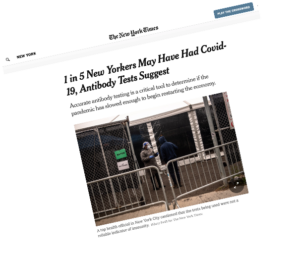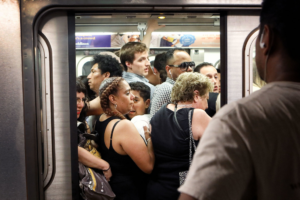The CDC has just reminded us of the public in public health. All of us are worried about staying healthy, but we must remember the larger picture. Wear a mask, but not for the reasons you think.
Surgical masks were never designed to protect the surgeon. In fact, they are not particularly effective at protecting the wearer against breathing in airborne viruses. That is why health care workers are getting sick and dying. Surgical masks are designed to contain the airborne droplets that emerge when we cough, talk, or even breathe. They are designed to protect the patient.
Most advice on the issue, including mine as an environmental epidemiologist, has focused on the possibility that the virus could be in the air and, without a mask, we might inhale it and get sick. Again and again, we have asked: who needs a mask to protect them from getting Covid-19? But that is the wrong question.
Years ago, on my first visit to Japan, I was surprised to occasionally see people on the streets of Tokyo wearing face masks. Japan is a culture of elaborate social rules. As a visitor, I tried hard to understand and respect them, but always had the lingering sense that I was a cultural bull stumbling through a shop filled with delicate porcelain conventions. Through my lens, those masks meant protection against air pollution and I wondered why those few people felt so concerned. Or why more didn’t. Did they have asthma or some other condition that made them sensitive?
But I had it all backwards.
The people in masks on the streets of Tokyo were not protecting themselves. Consideration for others is baked into the core of Japanese culture. They wore masks because THEY had respiratory infections, and to go out without a mask and spread disease was the height of irresponsibility. This deep inclination to protect society as a whole as opposed to the individual seems to prevail in the cultures of southeast Asia, and may help explain why the most successful responses to the outbreak appear to be in China, South Korea, Hong Kong, Singapore and Japan.
So, the reason we should all wear masks is because WE might be sick, and WE might infect others It has been shown that people shed the virus for about six days before they show symptoms. We can be sick and not know it.
Think for a moment about your grocery store. You spend 20 minutes there to shop. Maybe you shop twice a week. (If you’re shopping more than that, don’t.) Someone who works there spends 60 times that 40 minutes in a full work week. If there were a serious hazard in the grocery store, the people on the frontlines who are stocking shelves and bagging groceries would be dropping like flies. The real risk in the store is someone walking through who is sick, but doesn’t yet know it. Someone like you.
So yes, wear masks. But understand why. And embrace the notion that focusing on the self is bad for public health and bad for all of our health. As individuals, as regions, and as nations, we only survive and prosper when we consider our collective well-being first. We all share the same small rock in space. This pandemic is an object lesson in the fact that our fates our inextricably linked.
Selfishness is toxic. Literally. So, wear a mask. And look out for your neighbor.



Divinely expressed. My mind has repeatedly gone to the dichotomy between eastern and western cultures where one culture embraces the collective good and the other rejects it for infringing on individual rights. Or, put another way, collectivity and cooperation versus competition and conflict.
I’d like to think this catastrophe will offer hard lessons and opportunities for change that we don’t yet know, as virtually all hardships do, that will shift us globally to collectivity and cooperation.
Lynn Shepler MD JD
Rochester, MN
Brilliant. Thanks for your service
“They are calling a small temporary raise a ‘hero pay,’” said Lisa Harris, a 32-year-old grocery cashier in Richmond, Va., reflecting on the temporary $2 per hour raise her employer, Kroger, has introduced. “I don’t think that is enough, especially for those who started off at minimum wage. And it is only temporary during this crisis. I think that $15 an hour should be the minimum, and stay there. We are heroes every day, and we deserve to be paid as such. We haven’t gone from unskilled labor to essential personnel. We always were essential personnel.” frontline workers who are risking their lives for the rest of us to adequately compensate, support, recognize, and protect them. Hazard pay is the least we can do to compensate them for the risks they face—a down payment for what should be permanent increases so that all workers earn the dignity of a living wage.
I only hope this disaster helps people appreciate and fully value the low wage workers that we literally rely on for our survival.